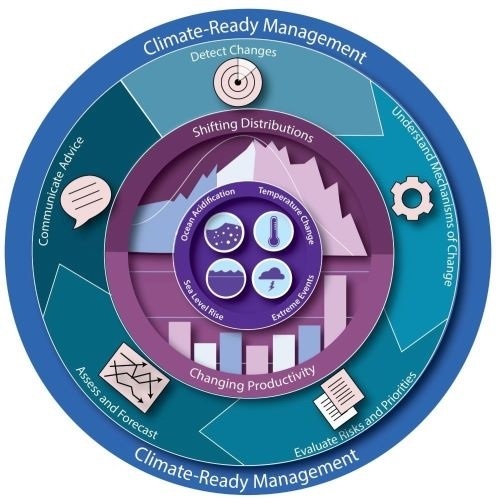 Fisheries in a Changing Climate – There are numerous challenges facing fisheries management under changing climate and ocean conditions. A new report from NOAA Fisheries identifies these challenges and makes recommendations on how NOAA can better detect, understand, assess, and manage shifting distributions and changing productivity of marine species with changing climate and ocean conditions.
Fisheries in a Changing Climate – There are numerous challenges facing fisheries management under changing climate and ocean conditions. A new report from NOAA Fisheries identifies these challenges and makes recommendations on how NOAA can better detect, understand, assess, and manage shifting distributions and changing productivity of marine species with changing climate and ocean conditions.
Shifts in species distributions and changes in productivity present challenges for fisheries management. As ocean temperatures warm, species move to remain within their preferred temperature ranges. These shifts may cross fishery management boundaries and impact where fishermen have to go to find their catch. Additionally, changes in climate, ocean, and ecosystem conditions can impact species’ vital rates. This could lead to changes in stock productivity and the amount of fish available to be caught.
To help address the numerous challenges facing fisheries management under changing climate and ocean conditions, NOAA Fisheries is working to increase the production, delivery, and use of climate and environmental information to fulfill the agency’s living marine resource stewardship mandates as called for in the National Climate Science Strategy, Ecosystem-Based Fisheries Management Road map, and Implementing a Next Generation Stock Assessment Enterprise. The new report identifies the main challenges hindering NOAA’s ability to account for climate change in fisheries management, and provides recommendations on how NOAA should address those challenges.
Climate-Informed Fisheries Management: A Six-Step Process – Developed by a team of NOAA scientists from across the United States, the new report identifies recommendations to strengthen six key steps in the science-to-management process. If enacted at appropriate regional and national levels, these recommendations would help NOAA Fisheries better prepare for, and respond to, shifting distributions and changing productivity of marine fish stocks.
- Detect and anticipate changes.
- Understand key drivers of changes.
- Evaluate priorities and risks.
- Conduct assessments and develop forecasts.
- Communicate scientific advice to management.
- Manage fisheries under changing conditions.
Some of the recommendations include:
Detect and understand changes: Key to developing appropriate management approaches that account for changing conditions is having data available to detect and understand changes. Therefore, the team emphasized that it is important that the agency continue to support and adapt surveys and monitoring efforts, and conduct process-oriented research to meet the data needs. Opportunities exist to make better use of current data collections, as well as to efficiently expand data collection by standardizing the type and frequency of data collected on existing surveys to allow better comparison across jurisdictions. Other key opportunities include leveraging the capacity of fishermen and citizen science programs, operationalizing advanced sampling technologies that can collect information at appropriate temporal and spatial scales, and using electronic technologies to more efficiently collect fishery-dependent data.
Evaluate risks: The NOAA team recognized that it may not be necessary or possible to implement these changes for all stocks in a region. The group recommended the use of risk and vulnerability analyses to identify the stocks that are highest priority for addressing climate effects.
Explore future scenarios: Faced with shifting species distributions and changing productivity, NOAA Fisheries, the regional fishery management councils and interstate commissions should explore future scenarios, plan for emerging fisheries, re-evaluate their spatial and temporal management procedures, and develop responsive harvest control rules.
Increase Communication: Each step in the science-to-management process benefits from close collaboration and communication among scientists, managers, and stakeholders. Regularly scheduled workshops, debriefs, meetings, or other mechanisms to allow open dialogue and engagement between scientists and managers are essential for effective communication and collaboration. For instance, developing processes that allow scientists to provide timely information on ecosystem dynamics and species distributions to appropriate council bodies can be important to inform management decisions. Regular meetings would also provide scientists with feedback from managers to help prioritize the types of analyses and evaluations that would be most beneficial to sustainable fisheries management.
In addition to the Tech Memo, this effort resulted in a peer-reviewed journal article, which was recently accepted in ICES Journal of Marine Science and will be published as part of the upcoming Effects of Climate Change on the World’s Oceans Special Issue.
Related:
Cow Knob salamander fended off pipeline; can it beat climate change?
